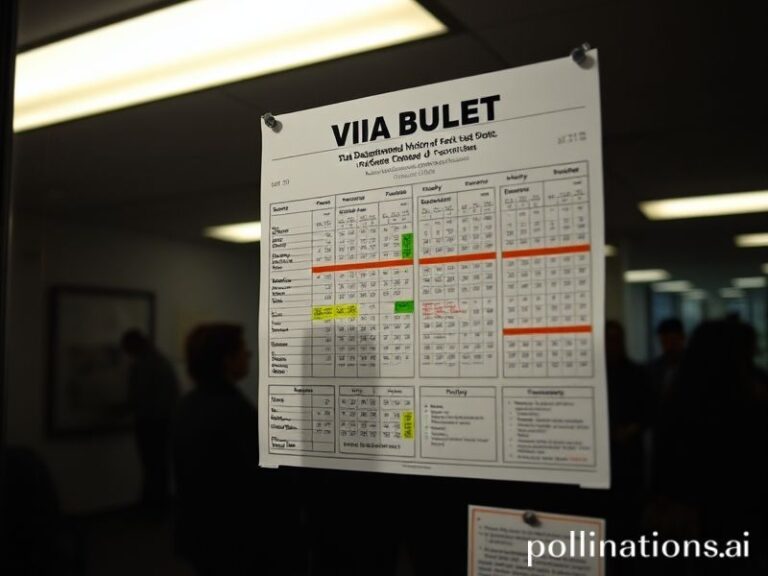Nepal’s 48-Hour Miracle: How One Judge Unraveled the Global Myth of Untouchable Power
When the Gods Pause Gavel-Wrestling: Sushila Karki and the Brief Miracle of Accountability in Kathmandu
By Our Correspondent, still recovering from altitude-induced optimism
KATHMANDU—If you blinked in April 2016 you missed it: a 63-year-old grandmother with the expression of a disappointed librarian stared down the entire political pantheon of Nepal and, for roughly 48 hours, won. Sushila Karki—first female Chief Justice in South Asia, lifetime subscriber to the “boring-is-good” school of jurisprudence—suspended the sitting police chief, hinted that ministers might be next, and sent the male gerontocracy scrambling for constitutional loopholes like teenagers forging sick notes. Then parliament impeached her mid-hearing, proving that while justice may be blind, it still has excellent survival instincts.
The international press filed the episode under “quirky Himalayan subplot,” somewhere below yet another Everest traffic jam. That was a mistake. Karki’s lightning tenure was the rare moment when a developing-world institution momentarily forgot its traditional role as a decorative fig leaf and tried—brace yourself—actual oversight. In a year when British judges were branded “enemies of the people” for daring to question Brexit and the U.S. Supreme Court resembled a lifetime-appointment frat party, Nepal’s improvised constitutional guardrail looked almost avant-garde. Turns out you don’t need centuries of precedent; you just need someone who believes paperwork is sharper than a khukuri.
Global implications? Start with the obvious: if impeachment can be triggered by a judge doing her job too well, imagine the chilling effect on any bureaucrat contemplating anti-corruption math from Guatemala to Ulaanbaatar. Karki’s defenestration was streamed live, offering autocrats a handy tutorial: wrap the purge in parliamentary procedure, sprinkle gendered epithets (“hysterical,” “menopausal,” pick your poison), and presto—no international sanctions, just a collective shrug and a fresh batch of donor-funded “governance reform” workshops. The World Bank duly sent a new PowerPoint, everyone clapped, and the carousel spun on.
Yet the episode also dumped a crate of Himalayan salt on the West’s self-congratulatory rule-of-law narrative. While European diplomats tweeted #StandWithSushila, back home their governments were busy outsourcing judicial independence to “emergency” decrees and prorogations. Karki’s crime was exposing the universal truth that every legal system protects somebody; the only variable is who’s paying the invoice. In Nepal that would be the trekking-mafia-cum-cement-cartel, plus their seasonal coalition partners—essically a student government with access to armored cars. In your country, substitute defense contractors or tech monopolies to taste.
Still, the affair left microscopic spores in the Kathmandu air. Since 2016, the Supreme Court has invalidated two dissolutions of parliament and forced a sitting prime minister to vacate office—modest miracles by global standards, but cataclysmic in a nation where prime ministers used to be recycled more often than Yeti Airlines boarding passes. Young female law students now cite Karki the way Cuban medics invoke Che: imperfect, occasionally authoritarian, but proof the machine can be jammed. Meanwhile, men in suits continue to promise “stability,” a Nepali euphemism for keeping the aid-dollar pipeline diarrhea-free.
What does the planet learn from this brief judicial mutiny? First, that gender milestones are photo-ops until backed by institutional memory sticks; second, that impeachment remains the elite’s preferred unsubscribe button; and third, that hope is best consumed like raksi—local moonshine—swiftly, with eyes watering, before the hangover of realism kicks in. Sushila Karki never claimed to be Solon in a sari; she was simply a meticulous civil servant who misread her job description as binding. For two chaotic weeks the universe allowed Nepalis to glimpse a world where paperwork beat patronage. Then gravity, parliament, and a 257-vote majority reasserted themselves, and the mountain air once again smelled of diesel, dal bhat, and the faint whiff of deferred dreams.
But somewhere in a quiet retirement garden, Karki is still pruning roses with the same serene disapproval she once reserved for perjured ministers. The gods are back to their eternal gavel-wrestling match, yet the memory lingers: occasionally, very occasionally, the referee forgets the fix is in. And for the rest of us, that’s as close to transcendence as 21st-century governance gets.







